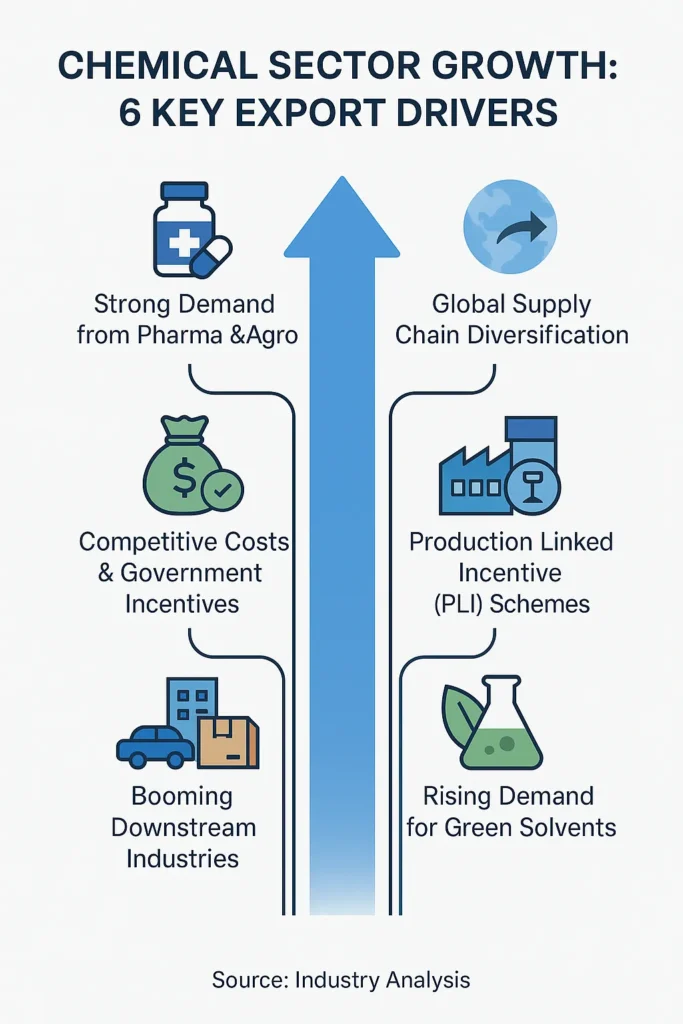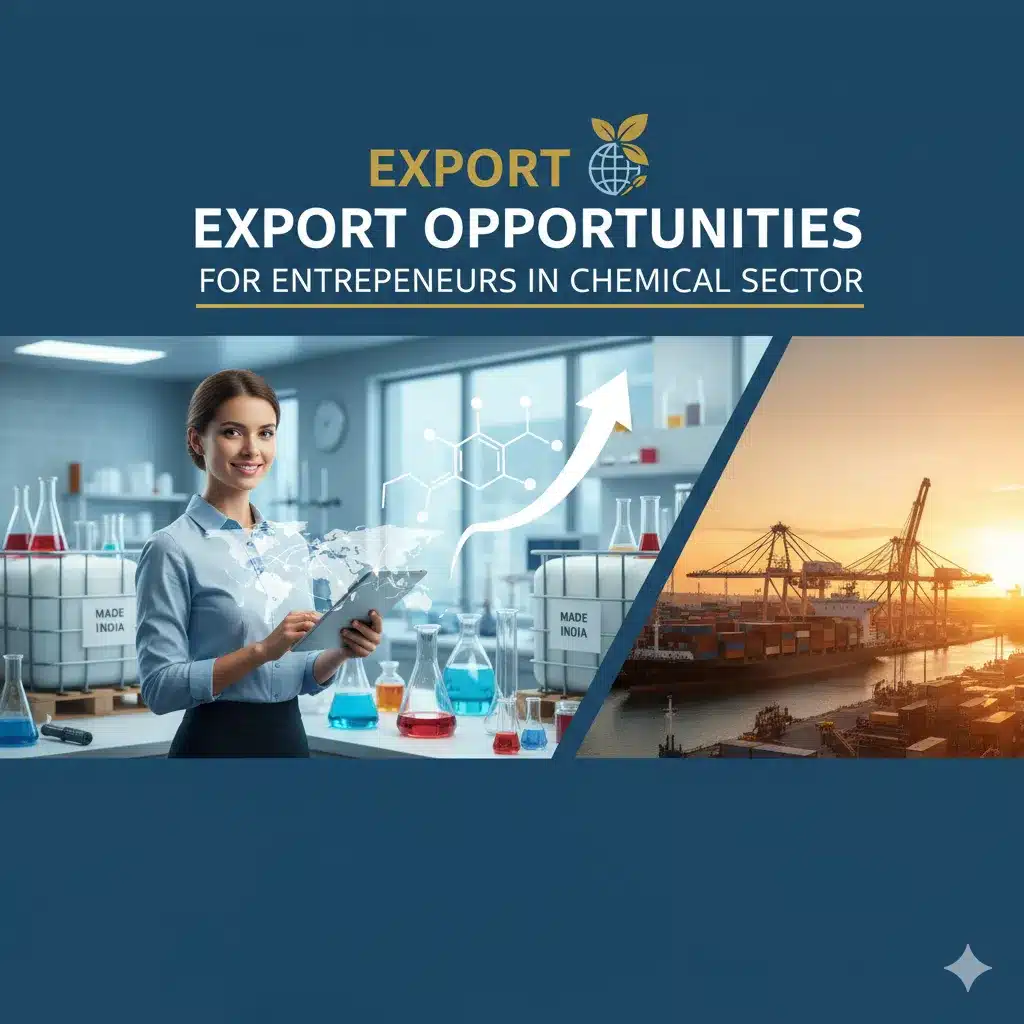India has maintained a strong reputation for being a reliable supplier to multiple industries and is now quickly closing the solvent demand gap in global supply chains. India is capturing international market demand as buyers are moving away from China.
Startups that focus on high value intermediates will benefit further as their ancillary services will become exportable and easier to offer as India’s import dependence starts to slowly decline. Also, India’s action oriented policies and long-term industrial plans are set to make India an influential global chemical supplier.
Market Overview
Methanol, acetone, acetonitrile, and DMF, for instance, are used as bulk solvents for pharmaceuticals, paints, agrochemicals, and adhesives. In this regard, India spends millions on the importation of bulk solvents, especially methanol.
India, however, remains competitive in exports of pharma and specialty chemicals. The country has the capital, expertise, and infrastructure to expand into high value derivatives. Thus, India is poised to increase her export of specialty intermediates to numerous countries.
Read Our Book: Click Here
Import-Export Trends
Methanol, Acetone, DMF etc. are just a few of the imports. Shipments, mostly from the Middle East, are constantly received at the Kandla, Mumbai, and Vizag ports. The country faces a shortage of other intermediates such as acetonitrile.
Exports too are strong. India exports APIs, specialty chemicals and a wide range of high-value intermediates to Africa, Latin America and Southeast Asia. With many buyers wanting to switch from China, a lot of new opportunities are available for Indian start-ups.

Growth Drivers
Export-led structural change in the chemicals sector is supported by:
- Increasing demand for chemicals from the pharmaceutical, paint, and agrochemical industries
- Global supply chain diversification away from China
- Competitive labor and production costs
- Government support via Production Linked Incentive schemes
- Growth of the downstream industries such as automotive, construction, and packaging
- Interest in sustainable and green solvents
Foundational Principles of Manufacturing
Bulk Solvents
- Methanol: Synthesized from natural gas via steam reforming.
- Acetonitrile: Obtained as a by-product of acrylonitrile manufacturing.
- Acetone: Produced by oxidation of cumene and phenolic product from its oxidation.
- DMF: Derived from dimethylamine and carbon monoxide.
High Value Intermediates
- Amines and esters: Formed as a result of hydrogenation, esterification, and even halogenation.
- Chlorinated derivatives: Formed as a result of batch controlled chlorination.
- Acrylic derivatives: Formed by esterification of acrylic acid.
To compete globally, startups must employ sophisticated catalysts, apply stringent quality standards, and include stability in all tasks.
Read More: How to Start Exporting Specialty Chemicals
Opportunity for startup
In India, the start of start-up culture allows for rapid expansion:
- Reduction imports: Develop domestic features for the production of methanol, acetonitril and DMF.
- Increased exports: High-value supply to countries of Africa, Latin America and Southeast Asia.
- Pioneering Green Chemistry: Design eco-friendly, bio derived solvents.
- Working as contract makers: Shifting from China cooperate with global organizations.
- Vertical integration: Use of high benefits from coatings, adhesives and pharma yogas.
Opportunities by Sector
- Methanol: Domestic production instead of imports.
- Pharma Solvents: Manufacture acetonitrile and dira methyl formamide to satisfy domestic and export markets.
- Agrochemical Intermediates: Make chlorinated solvents and Acrylates.
- Green Solvents: Research bio-based ethanol derivatives for sale in Europe-U.S. markets.
- Specialty Intermediates: Export niche amines and Esters with high margins.
Inspirational Thoughts by Indian Leaders
- Mukesh Ambani: Multi-faceted investments that won’t be pegged to petroleum.
- Ratan Tata: Established global brand through acquisition and innovative branding.
- Kiran Mazumdar-Shaw: Demonstrated that Indian biotechnology can be number one in the world.
- Dilip Shanghvi: Won the title of a world leader in the pharmaceuticals industry for Sun Pharma through sheer willpower.
From their stories, we learn that adaptability and a vision in world engagement can lead to unending triumph.
Read Our Project Report: Click Here
How NPCS Can Assist You
Launching a chemical venture requires knowledge of the industries, technical aspects, sound financial and market strategies. Right at this moment, Niir Project Consultancy Services (NPCS) steps in as your best ally. NPCS prepares the Market Survey cum Detailed Techno-Economic Feasibility Reports (DPRs) for all the steps involved in setting up a new chemical plant.
The reports cover all the steps of the production cycle: the method of manufacture, the principal and auxiliary raw materials, the machinery, the process flow diagrams, and the principles of product mix planning.
The reports include elaborate strategies for the market, demand forecasts, competition structure, and, most importantly, NPCS provides comprehensive financials of the project including all the components of investment and cost structure to profitability analysis.
Without our guidance, an entrepreneur is oblivious to the risks, unable to check feasibility, risks making the wrong decisions. If you are interested in import substitution, an export-oriented unit, or a green chemicals project, NPCS will ensure you progress with clarity and confidence.
Find the Best Idea for Yourself With our Startup Selector Tool
Conclusion
The Indian chemicals sector has to focus on exports to further growth. For instance, Indian startups could manufacture solvents locally and then export high-value chemical intermediates, thus dominating global chemical trade.
In addition, this decade is a prime time for Indian chemical entrepreneurs to take bold actions toward global expansion because of strong government support, growing international demand and professionalism from NPCS.
FAQs
Q1: Why does India import so much methanol and acetonitrile?
The reason is that demand is much greater than the local production.
Q2: Which countries can Indian startups target for exports?
Indian startups can target Africa, Southeast Asia, and Latin America.
Q3: What are “green solvents”?
Green solvents are solvents which are eco-friendly and made from renewable sources.
Q4: How can NPCS help chemical startups?
NPCS can help chemical startups by giving them feasibility reports, market research, and financial analysis.
Q5: What is the biggest opportunity for new chemical ventures?
The import substitution of solvents and the export of high-value chemical intermediates.







